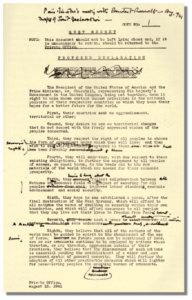Forgotten Friday – The Atlantic Charter
Even before the US became an official belligerent in WWII, President Roosevelt worried about the common war aims of the US, Great Britain, and the Soviet Union. By covenant and inference Roosevelt, Churchill and Stalin had agreed to the defeat of Nazi Germany as a common war aim for their nations to survive and prosper. Germany would be forced to disarm, reform, and submit to an international treaty regime that would forever restrict its power for imperialistic expansion and political coercion through the threat of war.
In the fact of opposition entering the war or forming an alliance with Great Britain and the Soviet Union, Roosevelt wanted a general statement of war aims that would appeal to idealistic, internationalist Americans. Since Churchill and Stalin and reputations as imperialists, Roosevelt knew they had few little admirers in the US beyond anglophiles and dedicated Communists, but FDR could at least improve Churchills image as a firm alley and internationalist if he signed this treaty.
Between 9th and 12th August 1941, Roosevelt and Churchill met aboard warships in Placentia Bay, Newfoundland to discuss their current strategic relationship and their future if the US became a belligerent. They also wanted to reassure Stalin that they would aid him in his defence of the Soviet Union, largely threatening Japan and saving Stalin from a war on two fronts. Part of Roosevelt’s bargain in aiding Great Britain with surplus US Navy destroyers and Lend-Lease supplies was to convince Churchill to sign the Atlantic Charter. This enabled a start of a growing relationship and repair of damage that had been done to Britain in the war.

Churchill and Roosevelt at the Atlantic Conference 10th August 1941
The Atlantic Charter document was a promissory pact between the US and Great Britain that was aimed to reassure their own people and potential allies that they did not seek imperial gains in territory or economic advantage, and that they believed in freedom of the seas and national self-determination. This was an attempt of support and relationship between the Allies for their futures but did it work?
The document also contained a hope for the future that embodied Roosevelt’s ‘Four Freedoms’. They were freedoms from fear, freedom from want, freedom to worship, and freedom of speech. This was announced by President Roosevelt in a speech in January 1941. Churchill who at the point in the war would, by his own admission, have made a pact with the devil, agreed that these could were admirable statements of principle, he did not comment on their likelihood of realisation. Sharing Churchill’s desperation, Stalin agreed to accept the Atlantic Charter later in the year.

The Atlantic Charter with Churchill’s notes in the margins
Neither FDR nor Churchill signed an Atlantic Charter document; instead, they made it a press release. However idealistic and expedient, the provisions of the Atlantic Charter eventually took on life in the Charter of the United Nations. How interesting is that?

